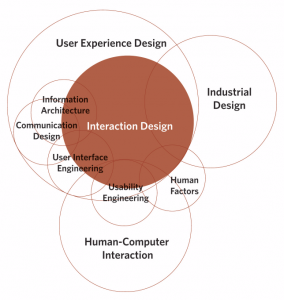
I think this diagram very well describes the other disciplines interaction design overlaps with.
From page 17 of Dan Saffer’s book, Designing for Interaction: Creating Smart Applications and Clever Devices
As you can see, most of the disciplines fall at least partially under the umbrella of user-experience design, the discipline of looking at all aspects of visual design, interaction design, sound design, and so on of the user’s encounter with a product or service and making sure they are in harmony.
Information architecture is concerned with the structure of content: how to best structure and label content so that users find the information they need. Yahoo, with its dozens of labeled and categorized content areas, offers an excellent illustration of information architecture.
Communication design is about creating a visual language to communicate content. The fonts, colors, and layout of Web sites and printed materials like this book provide examples of communication design.
Industrial design is about formshaping objects in a way that communicates their use while also making them functional. Physical objects like chairs, tables, and refrigerators illustrate industrial design.
Human factors makes sure those objects conform to the limitations of the human body, both physically and psychologically.
Human-computer interaction is closely related to interaction design, but its methods are more quantitative, and its focus (as its name implies) is strongly on how humans relate to computers, unlike interaction design, which is about how humans relate to each other. The operating system on your computer provides an example of HCI.
User-interface engineering is a subset of interaction design and HCI; it focuses on the controls of a digital device (see Chapter 6). Your digital camera’s display is an example of UIE.
Usability engineering is about testing products to make sure they make sense to users.It’s easy to see why people are confused!
Diagram via Ebacon.
What are your thoughts? Do you agree with the overlaps and containments? Or do you think otherwise?


Leave a Reply